Learning how to get rid of Japanese beetles on roses naturally doesn’t have to be a big hassle. There are several natural ways to tackle these pesky bugs. You can pick them off by hand, use traps, or try out some sprays. Let’s look at these easy methods to keep your roses looking beautiful and pest free.
Contents
- Handpicking
- Nematodes
- Milky Spore
- Garlic and Peppermint
- Diatomaceous Earth
- Japanese Beetle Traps
- Neem Oil
- Geraniums
- Cedar Oil
- Make Your Own Deterrent
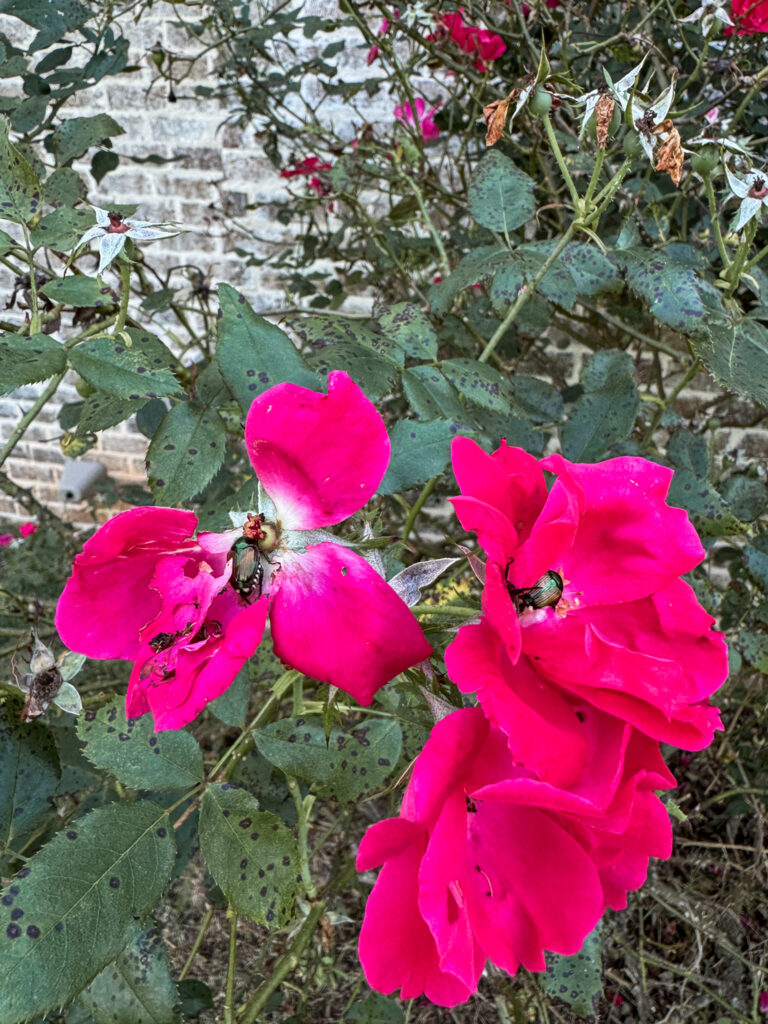
*This post may contain affiliate links which means I make a small commission at no extra cost to you. Read my full disclosure here.*
What are Japanese Beetles and How Did They Get Here?
Japanese beetles arrived from Japan and were first discovered at a plant nursery in New Jersey in 1916.
Since then they’ve continued to spread across the US. In Japan, they have natural predators that keep them from becoming so out of control. However, they don’t have those natural enemies here in the States so they reap havoc on gardens everywhere.
Japanese beetles love to find stressed or weak plants to feast on, and feast they will! I’ve had them destroy my knockout rose bushes in a matter of weeks. Once one beetle discovers a tasty snack like roses, the rest soon follow. Japanese beetle damage can be devastating.
Not only will they destroy plants like roses, but they’ll also take out fruit trees and bushes, vegetables, garden plants, and other ornamental plants.
While there are plenty of pesticides out there that will handle them, I don’t like to use harsh chemicals on my food or around my home.
Our chickens often munch on our gardens (unfortunately) and we also have honey bees around our property. Finding a natural solution to the Japanese beetle problem was very important.
If you’re struggling with Japanese beetles too, here are a few more natural remedies to help you control them.
Handpicking
Handpicking adult beetles is my main method for controlling Japanese beetles on roses. Using this method early on in the season can be a great t way to reduce the number of beetles you have.
Beetles are similar to bees in that they send out members to explore areas of good food. In early summer (which is late May or late June here in zone 8) you’ll start to see a few adult Japanese beetles appear on your plants.
You need to remove these visitors immediately before they can signal to other beetles that this is a good food source.
Handpicking beetles is really simple:
- Get a bucket of water. Not a big one, and light enough to lift up.
- Add about 2 teaspoons of dish soap per gallon of water.
You can either grab the beetles with your fingers (This is what I do) and put them into the bucket of soapy water, or hold the bucket underneath the leaf and shake them into it. They tend to drop instead of flying off.
The soap will suffocate the beetles in the water. I’ve tried this method without adding the soap and you’d be surprised at how long they can swim around in there.
Don’t dump the beetles and the soap water out. This is important and we’ll discuss that part later.
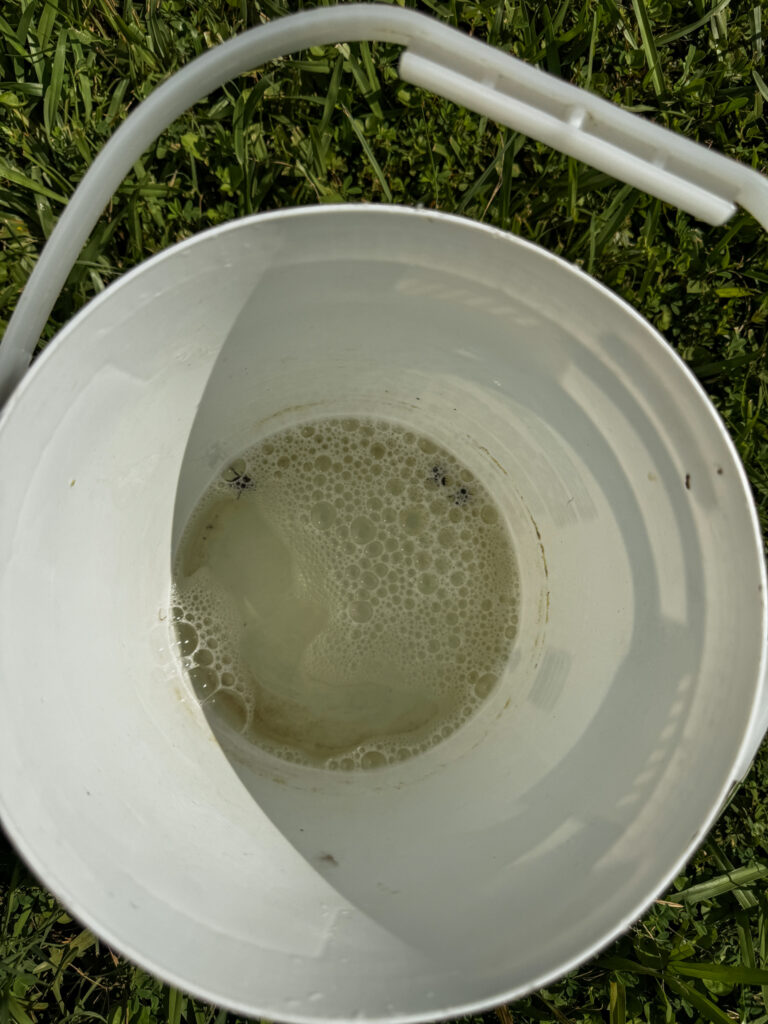
Nematodes
Nematodes are microscopic parasites that live in the soil. They love to feast on the larvae of a variety of pests like Japanese beetles. Japanese beetle larvae live in the soil and eat grass roots. Nematodes will kill them while they are still in the soil.
The best part about nematodes is they don’t impact beneficial insects like worms and ladybugs. They won’t have an impact on anything but the Japanese beetles.
You can introduce beneficial nematodes at any time to your garden as long as the soil temperature is above 45° F. Make sure you’re getting the right species and amount for the best results. You will continue to see less beetles emerging each following year after treatment.
Heterorhabditis bacteriophora is great for controlling Japanese beetle populations because they feast on larvae that live deep in the soil. Do your research before deciding on nematodes.
Milky Spore
Milky spore is a naturally occurring bacteria that’s used to get rid of Japanese beetles on roses. it works by reducing beetle populations while they are grubs. The grubs will ingest the milky spore and become sick with milky disease.
Milky spores won’t harm beneficial insects or pets. It won’t harm anything except Japanese beetles so It can’t be used to treat other garden grubs. You need to be sure that you’re dealing with Japanese beetle grubs before you decide to treat them with milky spore.
This is a granule l that needs to be spread all over your yard so you’ll need a spreading device. Also, milky spores can irritate your skin so be aware to wear protective gloves and clothing when dealing with it.
Be sure to spread milky spores evenly across your lawn and garden. The Japanese beetle larvae will migrate to an area that hasn’t been treated if you spot treat.
Also, milky spore will decrease your beetle numbers but it won’t get rid of them entirely. While it can protect your yard for up to 20 years once it gets established, it will take up to 5 years for that to happen. You’ll still need to handpick and monitor your plants.
Garlic and Peppermint
If you want a passive way to get rid of Japanese beetles on roses, companion planting has been used for hundreds of years to control pests in the garden. Recently, there has been a resurgence of interest in companion plants. I love this method of pest management because it’s so passive.
Some research suggests that Japanese beetles will avoid plants like garlic and peppermint. Their scouts won’t seek out areas where these plants are growing.
If you live in an area with a large Japanese beetle population it’s not a bad idea to strategically place these around your susceptible plants.
You should be careful with peppermint as it can become invasive and take over the area. Also, these plants might be a deterrent, but you’ll most likely need other forms of pest control to use concurrently.
Still, I don’t think you can ever have too much garlic or mint around. They are multipurpose and great to use in the kitchen.
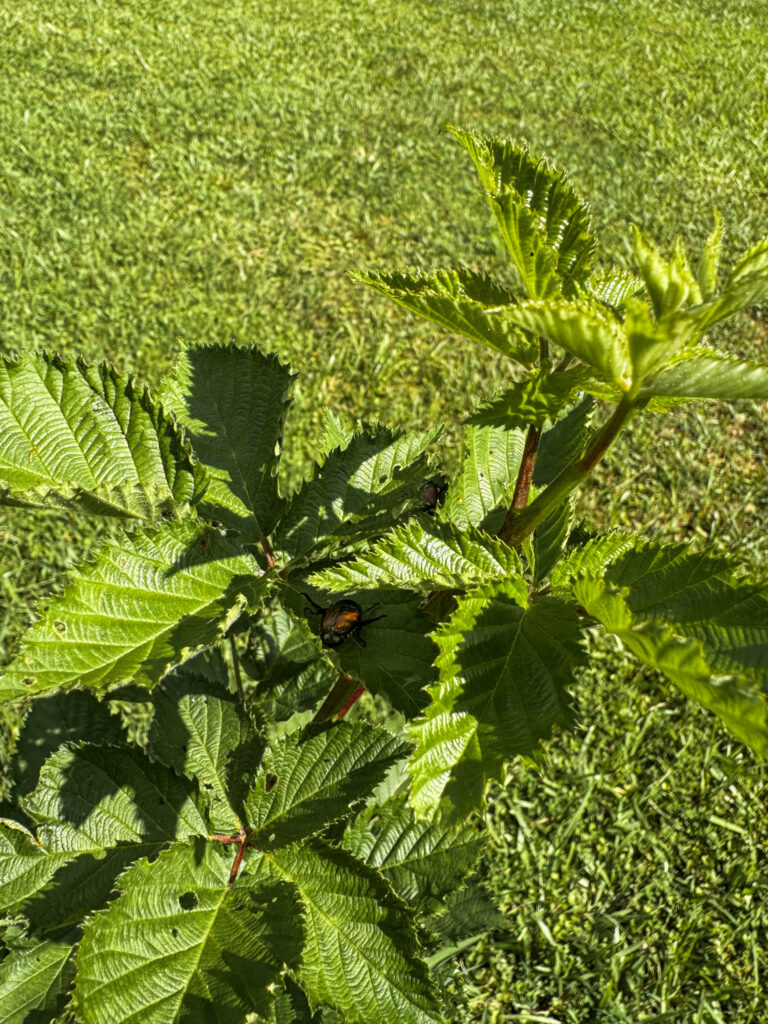
Diatomaceous Earth
Diatomaceous earth (DE) is the workhorse of the homestead. It’s a great, non-toxic form of pest control. You can sprinkle it around your chicken coop to help control external parasites as well as use it in the garden to control harmful insects like Japanese beetles.
DE is the fossilized remains of tiny aquatic life that have been ground into a powder. It has jagged edges that will pierce soft-bodied pests like bird mites and will get under the protective shell of the beetle, eventually killing it.
One drawback to using DE in the garden is it can also harm some beneficial insects. The jagged edges wear away at the insect’s natural protection and cause it to dehydrate.
However, if you sprinkle DE around the base of the plant, it shouldn’t be an issue for flying insects. The insect needs to crawl through it for it to harm them.
You can also sprinkle DE directly on the plant itself, but avoid the blooms that the bees like to hand out.
DE can also harm your respiratory system so take precautions when you’re using it around the homestead.
Japanese Beetle Traps
Beetle traps will catch a large number of beetles on your property. They work by having a specific scent that the Japanese beetles find irresistible. Once they crawl into the pheromone traps, they’re caught there until they die.
When I first hung beetle traps I was amazed at the amount of beetles it could catch. I hung them all around our property far away from the places the beetles like to hang out. That way it would draw them away from my plants.
What I didn’t realize is that the scent was attracting even more beetles to our property than were already there. In my opinion, it made the problem worse.
However, I have heard of many people having great success with the traps which is why I tried them in the first place. If you have a Japanese beetle infestation they’re worth giving a try.
They are a natural form of pest control and you don’t have to worry about trapping or harming any other beneficial insects.
Neem Oil
Neem oil will get rid of Japanese beetles on roses. It’s naturally derived from Neem trees. It has a garlic-like smell, which as I mentioned above, deters Japanese beetles from the plant.
Neem oil is a natural pesticide that only affects the leaf eaters when it is sprayed on the leaves. It doesn’t cause as much harm to the beneficial insects, especially the flying ones.
However, be sure to dilute the neem oil in a spray bottle as directed and only use it on the leaves of the plant. Never spray it on the buds and blooms where beneficial insects like to hide.
There’s also some research to support neem oil toxicity in humans when it’s consumed in large amounts. I believe this is a very rare happening however, If you have pets and young children around be sure to keep them in a safe and locked-up area.
Geraniums
White geraniums have a paralyzing effect on Japanese beetles. When the beetle ingests the leaf or the flower of the geranium it causes it to fall on its back unable to move for a day or so.
This leaves the beetle dehydrated, or susceptible to predators. It’s also a great time for you to handpick the beetles and dup them with some soapy water.
Plant geraniums in beds all around your property to draw the beetles away from the plants you don’t want them to munch on.
Not only are geraniums great for deterring Japanese beetles, but they also help deter cabbageworm. They are beautifully planted among the cabbage heads while doing their job.
Cedar Oil
Cedarwood oil is a great way to get rid of Japanese beetles on roses as well as mosquitos. Simply spray it on the plants you want to protect and let it work its magic.
Cedar has been used and proven for hundreds of years to help get rid of all kinds of pests. My grandmother had cedar chests, closets, and armoires to store her clothing in while protecting them from insects.
The oil is so potent you can’t use cedar shavings for chicken bedding because it will irritate their respiratory system.
The cedar oil will eventually shut down the beetle’s functions and they’ll die..if they approach it in the first place. Here’s a great recipe for making your own.
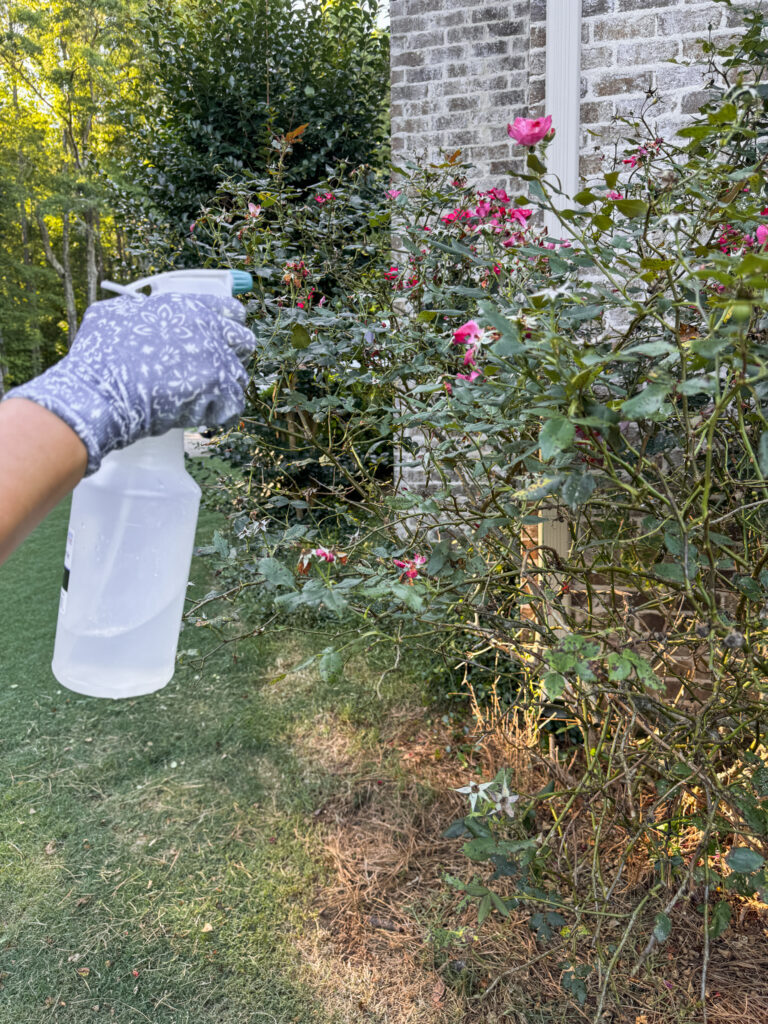
Make Your Own Japanese Beetle Deterrent
Remember when I said not to get rid of the soapy water with the dead beetles in it? That soapy water can act as a natural deterrent to the beetles.
When you leave the dead beetles in the soapy water they’ll start to break down. The smell that’s produced from that will send a signal out for other beetles to stay away.
Place the bucket underneath your rose bush and let it sit there for a while in the sun. Once the beetles start to break down, you’ll have a natural pest deterrent.
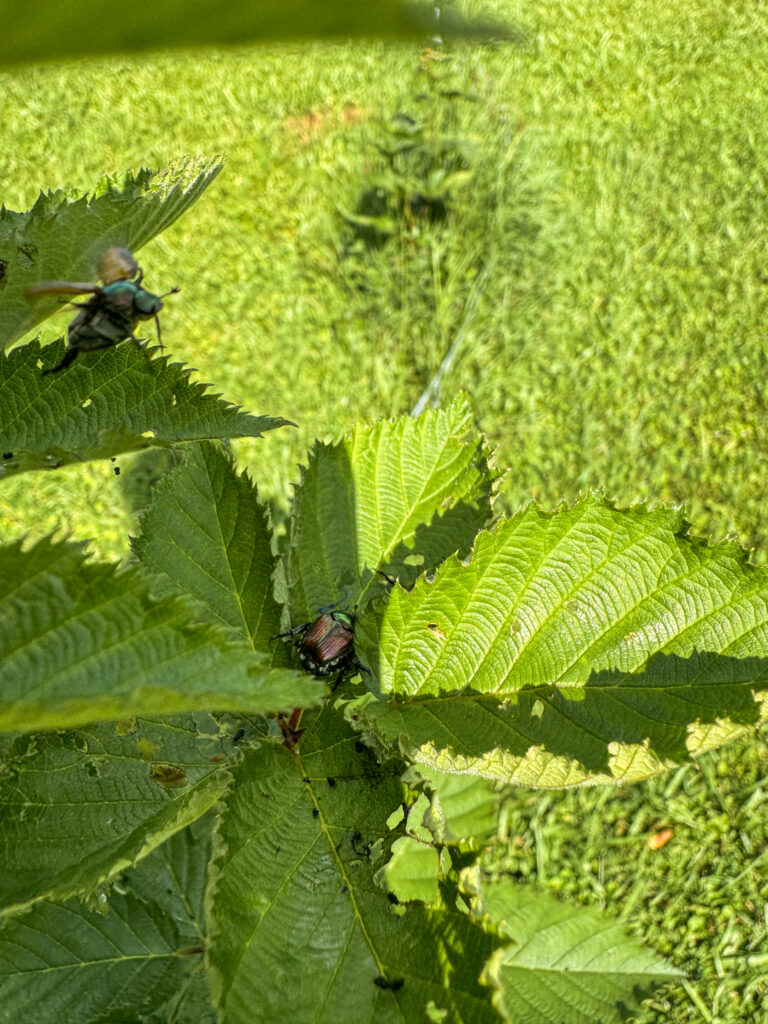
Natural Ways To Get Rid Of Japanese Beetles FAQs
Are there any other natural sprays that work?
Yes, there are a lot of homemade sprays that can help deter Japanese beetles from your roses. I use a mixture of mixture of peppermint oil, and dish soap, to create a spray that will help protect rose bushes. Add a little baking soda to this mix and it’s great for protecting plants from blight and powdery mildew.
How often should I use these methods?
Being consistent is key! Regularly handpick beetles, apply treatments like DE and Neem oil, and keep up your companion plants to keep Japanese beetles away from your roses. An early morning coffee and a walk around your garden will go a long way!
How To Get Rid of Japanese Beetles on Roses Naturally- Final Thoughts
Keeping Japanese beetles off your roses naturally is doable with a few simple steps. Handpicking beetles is a quick fix while using nematodes and milky spores helps control them over time. Diatomaceous earth (DE) and Neem oil are good treatments, and planting geraniums can deter them too. Cedarwood oil and companion plants like garlic and mint also help keep them at bay. With these natural methods, your roses can stay healthy and free from those pesky bugs.
If you enjoyed this article, please share it! Thanks for visiting my farm.
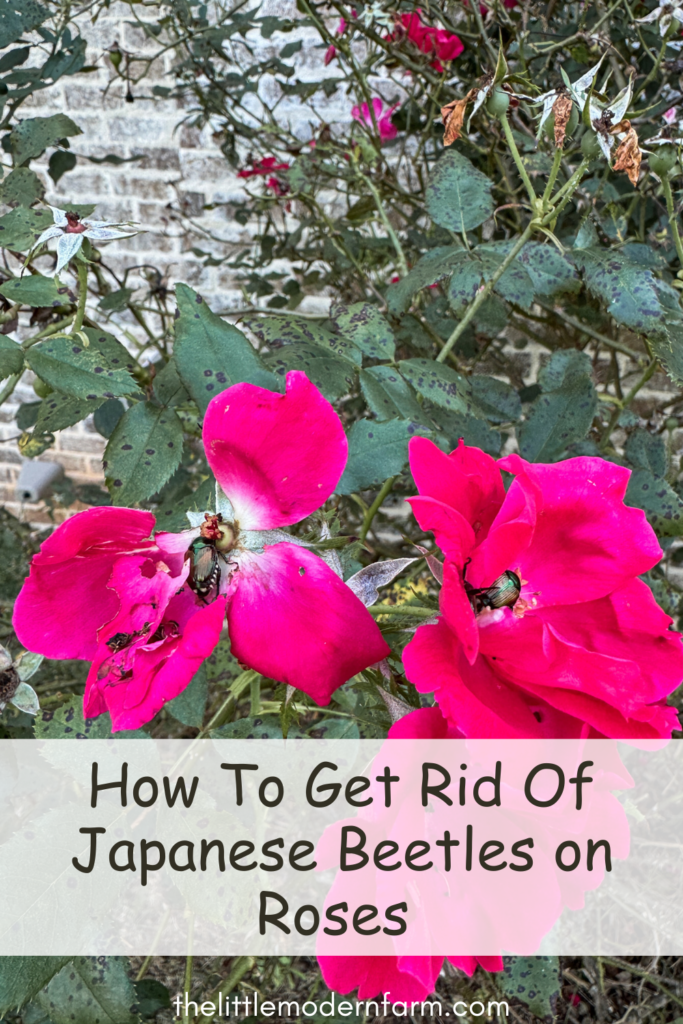
More From The Farm
Aphids are small but mighty and will damage your plants. This easy DIY Aphid spray will help to keep those tiny pests at bay. Keep it on hand all summer long to help protect your garden.
Leave a Reply